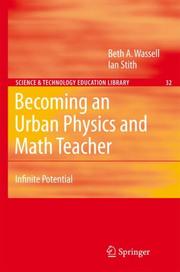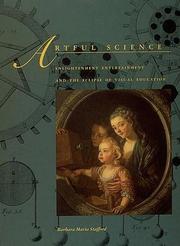| Listing 1 - 5 of 5 |
Sort by
|
Book
ISBN: 0631171142 Year: 1989 Publisher: Oxford Blackwell
Abstract | Keywords | Export | Availability | Bookmark
 Loading...
Loading...Choose an application
- Reference Manager
- EndNote
- RefWorks (Direct export to RefWorks)
Mathematics --- Jeux et récréations mathématiques --- Mathematical recreations --- Wiskundige spelletjes --- Mathematical puzzles --- Number games --- Recreational mathematics --- Recreations, Mathematical --- Puzzles --- Scientific recreations --- Games in mathematics education --- Magic squares --- Magic tricks in mathematics education

ISSN: 15725987 ISBN: 1280938439 9786610938438 1402059221 1402059213 9048174759 Year: 2007 Volume: v. 32 Publisher: Dordrecht : Springer,
Abstract | Keywords | Export | Availability | Bookmark
 Loading...
Loading...Choose an application
- Reference Manager
- EndNote
- RefWorks (Direct export to RefWorks)
What happens as beginning urban teachers transition through their first few years in the classroom? This book captures one teacher's journey through the first three years of teaching science and mathematics in a large urban district in the US. The authors focus on Ian's agency as a beginning teacher and explore his success in working with diverse students. Using critical ethnography combined with first-person narrative, they investigate Ian's teaching practices in four contexts: his student teaching experience, his work with students on a summer curriculum development project, his first year of teaching in a small, urban high school, and his second year of teaching in a large, comprehensive high school. In each field, the authors describe the structural changes Ian encounters and the ways in which he re-utilizes the practices he used successfully in previous fields. Specific practices that helped foster community and led to the increased agency of his students as learners are highlighted.
Physics --- Mathematics --- Urban schools --- Study and teaching. --- Curricula. --- Inner city schools --- City schools --- Schools --- Science --- Mathematics. --- Learning & Instruction. --- Teaching and Teacher Education. --- Science Education. --- Mathematics Education. --- Math --- Science education --- Scientific education --- Learning. --- Instruction. --- Teaching. --- Science education. --- Mathematics—Study and teaching . --- Didactics --- Instruction --- Pedagogy --- School teaching --- Schoolteaching --- Education --- Instructional systems --- Pedagogical content knowledge --- Training --- Learning process --- Comprehension
Periodical
Abstract | Keywords | Export | Availability | Bookmark
 Loading...
Loading...Choose an application
- Reference Manager
- EndNote
- RefWorks (Direct export to RefWorks)
Educational Studies in Mathematics presents new ideas and developments of major importance to those working in the field of mathematical education. It seeks to reflect both the variety of research concerns within this field and the range of methods used to study them. It deals with didactical, methodological and pedagogical subjects, rather than with specific programmes for teaching mathematics.
Didactics of mathematics --- Mathematics --- Mathématiques --- Study and teaching --- Periodicals --- Etude et enseignement --- Périodiques --- Peri 2710 (M 2012) --- Study and teaching. --- JEX3 --- -510.5 --- Math --- Science --- -Electronic information resources --- E-journals --- #TS:WWIS --- #BA01752 --- Applied Mathematics --- Arts and Humanities --- Education & Careers --- Mathematical Analysis & Logic --- Mathematical Sciences --- Étude et enseignement --- Arts and Humanities. --- Mathematical Analysis & Logic. --- Mathematical Sciences. --- Mathematics Education. --- Mathematikunterricht --- Mathematik --- Mathematikdidaktik --- Mathematischer Unterricht --- Rechenunterricht --- Didaktik --- Unterricht --- Schulmathematik --- Instruction and study --- Education

ISBN: 0262193426 9780262193429 9780262691819 0262691817 Year: 1994 Publisher: Cambridge, Mass. MIT Press
Abstract | Keywords | Export | Availability | Bookmark
 Loading...
Loading...Choose an application
- Reference Manager
- EndNote
- RefWorks (Direct export to RefWorks)
Optics [Psychological ] --- Perceptie [Visuele ] --- Perception [Visual ] --- Perception visuelle --- Vision--Psychological aspects --- Visual perception --- Visuele perceptie --- Visuele waarneming --- Waarneming [Visuele ] --- Optical illusions --- Scientific recreations --- Mathematical recreations --- Visual perception. --- Art, Modern --- Scientific literature --- Science --- History --- Study and teaching --- Medicine in Art. --- Optical Illusions. --- History, 18th Century. --- CDL --- 7.034 --- 18th Cent. History (Medicine) --- 18th Cent. History of Medicine --- 18th Cent. Medicine --- Historical Events, 18th Century --- History of Medicine, 18th Cent. --- History, Eighteenth Century --- Medical History, 18th Cent. --- Medicine, 18th Cent. --- 18th Century History --- 18th Century Histories --- Cent. History, 18th (Medicine) --- Cent. Medicine, 18th --- Century Histories, 18th --- Century Histories, Eighteenth --- Century History, 18th --- Century History, Eighteenth --- Eighteenth Century Histories --- Eighteenth Century History --- Histories, 18th Century --- Histories, Eighteenth Century --- History, 18th Cent. (Medicine) --- Illusion, Optical --- Illusions, Optical --- Optical Illusion --- Science in Art --- Art, Medicine in --- Art, Science in --- Arts, Medicine in --- Arts, Science in --- Medicine in Arts --- Science in Arts --- in Art, Medicine --- in Art, Science --- in Arts, Medicine --- in Arts, Science --- Art --- Natural science --- Science of science --- Sciences --- Science literature --- Optics, Psychological --- Vision --- Perception --- Visual discrimination --- Mathematical puzzles --- Number games --- Recreational mathematics --- Recreations, Mathematical --- Puzzles --- Games in mathematics education --- Magic squares --- Magic tricks in mathematics education --- Amusements --- Hallucinations and illusions --- Physiological optics --- history. --- Psychological aspects --- Related to --- Visual arts --- Medicine in Art --- Optical Illusions --- History, 18th Century --- history --- Medicine in the Arts. --- 18th century --- Art [Modern ] --- 17th-18th centuries --- Optical illusions - History - 18th century. --- Scientific recreations - History - 18th century. --- Mathematical recreations - History - 18th century. --- Art, Modern - 17th-18th centuries. --- Scientific literature - History - 18th century. --- Science - Study and teaching - History - 18th century. --- Natural sciences --- Medicine in the Arts --- Art, Modern - 18th century. --- Illusions d'optique --- Illustration scientifique --- Peinture --- Art et sciences --- 18e siècle --- Documentation --- Étude et enseignement --- Europe
Book
ISBN: 3540097414 0387097414 0387108602 0387115471 0387119876 0387138978 0387152032 0387164413 0387505490 3540073965 3540078584 3540089381 3540108602 3540115471 3540119876 3540138978 3540152032 3540164413 3540505490 1489984372 9786612839382 0387097422 1282839381 0387073965 9780387073965 9783540073963 9783540097419 9780387097411 9780387164410 9783540164418 9780387138978 9783540138976 3540397817 3540391096 3540385673 3540376003 3540097422 9783540097426 Year: 1984 Volume: 480 Publisher: Berlin Springer
Abstract | Keywords | Export | Availability | Bookmark
 Loading...
Loading...Choose an application
- Reference Manager
- EndNote
- RefWorks (Direct export to RefWorks)
For too many students, mathematics consists of facts in a vacuum, to be memorized because the instructor says so, and to be forgotten when the course of study is completed. In this all-too-common scenario, young learners often miss the chance to develop skills—specifically, reasoning skills—that can serve them for a lifetime. The elegant pages of Teaching Mathematical Reasoning in Secondary School Classrooms propose a more positive solution by presenting a reasoning- and discussion-based approach to teaching mathematics, emphasizing the connections between ideas, or why math works. The teachers whose work forms the basis of the book create a powerful record of methods, interactions, and decisions (including dealing with challenges and impasses) involving this elusive topic. And because this approach shifts the locus of authority from the instructor to mathematics itself, students gain a system of knowledge that they can apply not only to discrete tasks relating to numbers, but also to the larger world of people and the humanities. A sampling of the topics covered: Whole-class discussion methods for teaching mathematics reasoning. Learning mathematical reasoning through tasks. Teaching mathematics using the five strands. Classroom strategies for promoting mathematical reasoning. Maximizing student contributions in the classroom. Overcoming student resistance to mathematical conversations. Teaching Mathematical Reasoning in Secondary School Classrooms makes a wealth of cutting-edge strategies available to mathematics teachers and teacher educators. This book is an invaluable resource for researchers in mathematics and curriculum reform and of great interest to teacher educators and teachers.
Probabilities --- Stochastic processes --- Addresses, essays, lectures --- Logic, Symbolic and mathematical --- Mathematics --- Signs and symbols --- Signs and symbols. --- Study and teaching (Secondary). --- Juvenile literature. --- Logic, Symbolic and mathematical. --- Study and teaching (Secondary) --- Probability theory --- 51 --- 51 Mathematics --- 519.2 --- 519.2 Probability. Mathematical statistics --- Probability. Mathematical statistics --- 519.21 <063> --- 519.21 <063> Probability theory. Stochastic processes--Congressen --- Probability theory. Stochastic processes--Congressen --- Mathematics. --- Curriculum planning. --- Mathematics Education. --- Teaching and Teacher Education. --- Learning & Instruction. --- Curriculum Studies. --- Education, general. --- Curriculum development --- Education --- Instructional systems --- Planning --- Math --- Science --- Curricula --- Design --- Geometry, Differential --- Mathematical physics --- Congresses. --- Gaussian processes --- Population --- Congresses --- Statistical methods --- Gaussian processes. --- Probabilities. --- Stochastic processes. --- Statistical methods. --- Percolation (Statistical physics). --- Schrödinger operator. --- Stochastic partial differential equations. --- Mathematics—Study and teaching . --- Teaching. --- Learning. --- Instruction. --- Curriculums (Courses of study). --- Education—Curricula. --- Education. --- Children --- Education, Primitive --- Education of children --- Human resource development --- Instruction --- Pedagogy --- Schooling --- Students --- Youth --- Civilization --- Learning and scholarship --- Mental discipline --- Schools --- Teaching --- Training --- Core curriculum --- Courses of study --- Curricula (Courses of study) --- Curriculums (Courses of study) --- Study, Courses of --- Learning process --- Comprehension --- Didactics --- School teaching --- Schoolteaching --- Pedagogical content knowledge --- Probabilités. --- Géometrie différentielle --- Geometry --- Probabilities - Congresses --- Stochastic processes - Congresses --- Gaussian processes - Congresses --- Population - Statistical methods - Congresses --- Teachers --- Learning, Psychology of. --- Instructional Psychology. --- Study and teaching . --- Training of. --- Curricula. --- Learning --- Psychology of learning --- Educational psychology --- Learning ability --- Teacher education --- Teacher training --- Teachers, Training of --- Psychological aspects --- Probabilités.
| Listing 1 - 5 of 5 |
Sort by
|

 Search
Search Feedback
Feedback About UniCat
About UniCat  Help
Help News
News